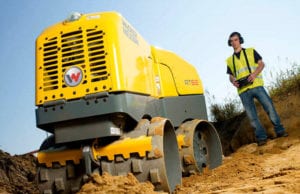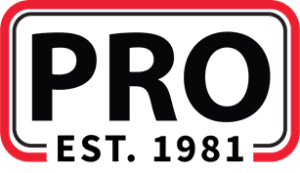
Trench rollers are particularly well suited for compacting cohesive soils under excavations, roads, and parking lots.
Compaction works by removing air pockets from the soil, and when you need to compact soil in tight spaces, trench rollers are the best tool for the job.
Trench rollers essentially punch the dirt and vibrate it, making it denser by shaking the particles into closer alignment. This process helps eliminate settling, cracking, and heaving when building driveways, sidewalks, floors, foundations, and walls.
Once soil is properly compressed, it holds a lot more weight. This is critical to prevent surprise “voids” in the soil which cause defects after a project concludes.
Here’s a quick guide to make sure you’re maximizing your investment, choosing the safest and most effective option, and getting the best trench roller for your project.
Things to Consider When Looking for a Vibratory Compactor
Trench Width
The key advantage of a trench compactor is its maneuverability in tight spots.
Depending on your project, you can choose between several widths to minimize the number of passes you need, while choosing a model small enough to maneuver easily, even through the narrow trenches you need to compact. Some models also have built-in sensors to let you know when you’ve achieved the density required for your project.
Safety
Trenches made in loose soil are often prone to collapse. In the past, when compactors had to be pushed manually through a site, this posed significant additional risk. Today, many options for trench rollers are remote-controlled from a distance effectively increasing site safety.
Most also offer built-in safety features such as an automatic shutoff when the trench roller senses that the operator is too close, or when another object collides with the roller.
For example, The Pro Group offers a built-in safety feature in its trench rollers which includes a prominently placed infrared receiving eye on top. This ensures that the remote-control contact is maintained permanently, even in trench shoring.
Compared to previous models, modern rollers also have enhanced stability over uneven terrain, improving their reliability.
Soil Type
Most rollers are either “sheepsfoot” rollers or smooth rollers. Deciding which is better for you depends on your project and the soil type.
If you are working in clay-heavy soil, or another cohesive substate, a sheepsfoot trench roller effectively mixes these layers together to achieve better compaction.
On the other hand, smooth rollers run over the layers without mixing them. They work best on granular materials like sand or gravel.
Pro Tool offers a wide range of compaction rollers suited to every task. You can check out our fleet of cutting-edge walk-behind rollers, trench rollers, and other vibratory rollers in various sizes and weights here.
Whether you are looking to rent or buy, our experts can walk you through the selection process by helping you find the right compaction equipment fit for your job.
Request a quote here or call us today at 1-844-671-2953 to speak with a representative.



